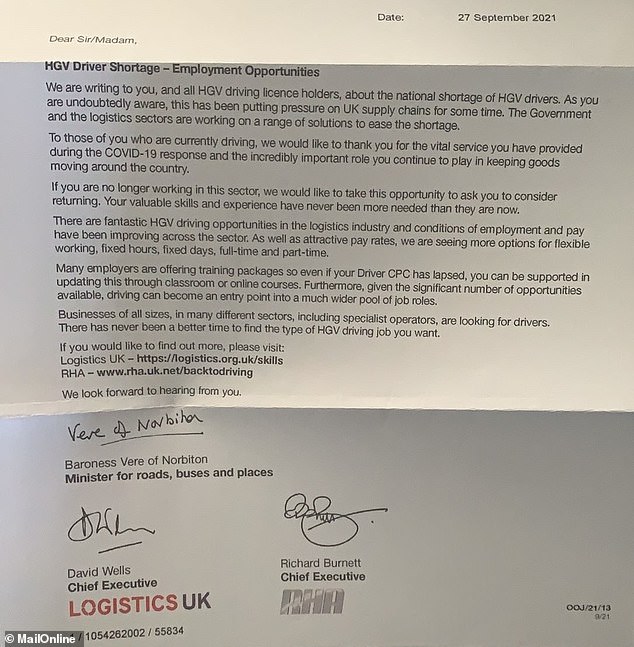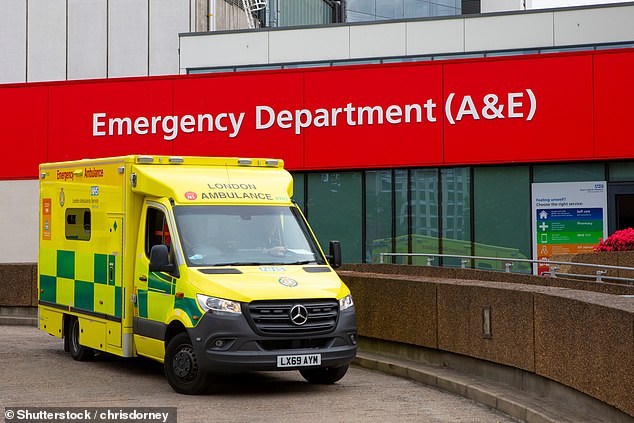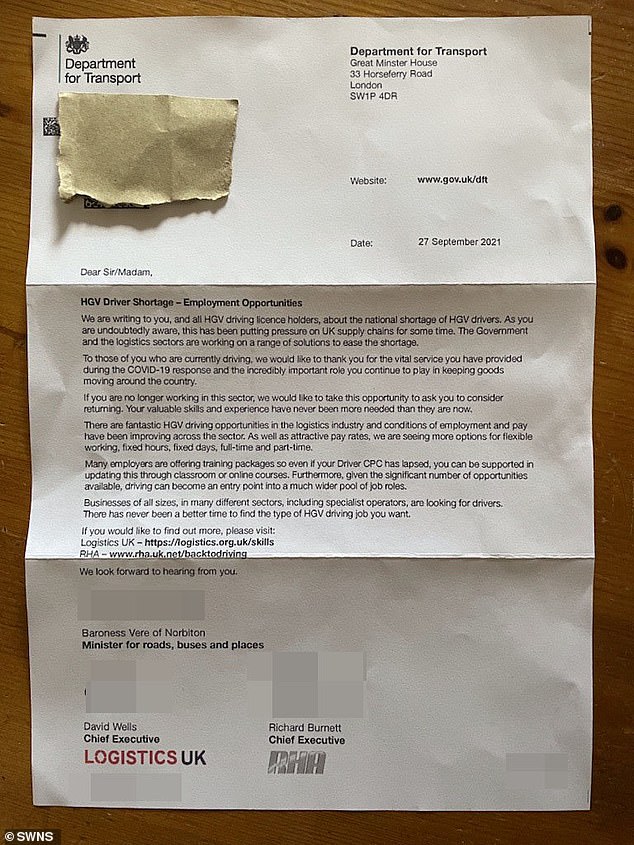The Government sent paramedics a letter that tried to lure HGV drivers back to the industry in a last-ditch attempt to fix the supply chain chaos that threatens to ruin Christmas, it was revealed today.
Nearly 1million people holding a Category C licences have received a letter from the Department for Transport asking them to become HGV drivers if they are not already working in the sector.
But the recipients include ambulance drivers, who are required to have the licence to drive vehicles weighing up to 7.5 tonnes.
Officials promised ‘fantastic’ opportunities, ‘attractive’ salaries and bragged about improved employment flexibility.
Paramedics today raised fears the letter will ‘tempt’ people away from the life-saving profession.
Dr Susan Crossland, president of the Society for Acute Medicine, told MailOnline the Government’s decision to ‘raid healthcare at such a desperate time’ shows its ‘short-sighted and out of touch perspective’.
But the Department of Transport insisted that it does not want ambulance drivers to change jobs or ‘be diverted from their vital work saving lives’. It is unclear how many paramedics received the letter.
The HGV driver sector has been in chaos for weeks due to a long-term shortfall of drivers, which has been spurred on by Covid. Tories have denied Brexit is to blame, with France, Germany and Spain also hit by shortages.
Britons have been struggling to buy fuel for nearly a week because there are not enough drivers to get supplies to forecourts.
Retailers predicted the lack drivers will hit supply chains up to Christmas, making it difficult for shoppers to get hold of essentials such as turkey, alcohol and toys, as well as driving up prices.
The crisis prompted ministers to introduce a temporary visa scheme that will see 5,000 HGV drivers brought in for three-month contracts.
And the army is also being brought in to train lorry drivers in an attempt to quell the delivery problems.

The Department for Transport sent a letter to nearly one million Britons with category C licences asking them to become HGV drivers to relieve pressure on UK supply chains. But the mailing list included paramedics who hold the licence to drive ambulances

Paramedics said the letter will tempt people away from the life-saving profession
WHAT DID THE LETTER SAY?
‘We are writing to you, and all HGV diving licence holders, about the national shortage of HGV drivers.
‘As you are undoubtedly aware, this has been putting pressure on UK supply chains for some time.
‘The Government and the logistics sectors are working on a range of solutions to ease the shortage.
‘To those of you who are currently driving, we would like to thank you for the vital service you have provided during the COVID-19 response and the incredibly important role you continue to play in keeping goods moving around the country.
‘If you are no longer working in this sector, we would like to take this opportunity to ask you to consider returning.
‘Your valuable skills and experience have never been more needed than they are now.
‘There are fantastic HGV driving opportunities in the logistics industry and conditions of employment and pay have been improving across the sector.
‘As well as attractive pay rates, we are seeing more options for flexible working, fixed hours, fixed days, full-time and part-time.
‘Many employers are offering training packages so even if your Driver CPC has lapsed, you can be supported in updating this through classroom or online courses.
‘Furthermore, given the significant number of opportunities available, driving can become an entry point into a much wider pool or job roles.
‘Businesses of all sizes, in many different sectors, including specialist operators, are looking for drivers.
‘There has never been a better time to find the type of HGC driving job you want.
‘If you would like to find out more, please visit: Logistics UK – https://logistics.org.uk/skills
‘We look forward to hearing from you.
‘Baroness Vere of Norbiton.
‘Minister for roads, buses and places.’
Advertisement
Any ambulance service staff that drive need a C1 licence to be behind the wheel of ambulances, which allows them to drive vehicles between 3.5 and 7.5 tonnes and is also required to drive a HGV.
The UK has a shortage of more than 100,000 HGV drivers, according to a survey by the Road Haulage Association.
Its members pinned the shortage on drivers retiring, Brexit, people moving to other industry, pay rates and Covid.
Companies are now offering more than £70,000-a-year to entice HGV drivers.
Meanwhile, an ambulance driver’s annual salary is around £25,000.
It comes as the NHS is expected to face a crisis this winter due to the expected higher volume of patients over the colder months, as well as dealing with a fourth wave of the pandemic and a bad flu season.
In an attempt to lure people to a career as a HGV driver, DfT asked nearly a million people with category C licences to work in the sector.
The letter states: ‘If you are no longer working in this sector, we would like to take this opportunity to ask you to consider returning.
‘Your valuable skills and experience have never been more needed than they are now.
‘There are fantastic HGV driving opportunities in the logistics industry and conditions of employment and pay have been improving across the sector.
‘As well as attractive pay rates, we are seeing more options for flexible working, fixed hours, fixed days, full-time and part-time.’
A paramedic, who wished to remain anonymous, said: ‘I was pretty taken aback – it was like they were trying to ask me to switch to a better paid job.
‘Being a paramedic is a very difficult and I can see some people being tempted which would be very bad news to our industry.’
A DfT spokesperson said: ‘We don’t want ambulance drivers to change jobs, or to be diverted from their vital work saving lives.
‘The letter was automatically sent to almost one million people with HGV driving licences, and it was impossible to narrow the copy-list by profession due to personal data protection.’
But it warned the move was aimed at people who are out of work and have a licence, or those in other sectors and including paramedics in the distribution list was an unintended consequence.
Data protection laws means the DfT could not see the job roles these licence-holders worked in, so they could not narrow circulation based on profession.
Dr Crossland said: ‘The government’s sacrifice of the NHS began long ago when it allowed chronic staffing, funding and bed shortages to become endemic.

In an attempt to lure people to a career as a HGV driver, DfT asked nearly a million people with category C licences to work in the sector. The letter states: ‘If you are no longer working in this sector, we would like to take this opportunity to ask you to consider returning. ‘Your valuable skills and experience have never been more needed than they are now’
‘But for it to still look to raid healthcare at such as desperate time for staff and patients is indicative of its short-sighted and out of touch perspective.’
Colm Porter, national officer at UNISON, the UK’s largest trade union, told MailOnline: ‘Adding to the already significant pressure on the ambulance service by robbing Peter to pay Paul isn’t going to help.
‘Staff shortages and extra demand because of Covid mean crews are so stretched several ambulance services have already called in the military.
‘Enticing scarce staff away will pile the pressure onto the service, resulting in long wait 999 times, with potentially deadly consequences.’
No10’s Business Secretary admitted yesterday he can’t ‘guarantee’ that the UK’s fuel crisis and lorry driver shortage won’t hit Christmas for millions.
Kwasi Kwarteng’s warning came as retailers predicted a lack of HGVs and delivery drivers will hit supply chains and also force up prices by December.
It came as the UK’s roads are clogged with drivers queueing for fuel because of a lack tanker drivers. In a string of crises for the country, soaring gas prices have hit millions in the pocket and a shortage of CO2 hurting the supply of food and drink.
Source link : https://www.dailymail.co.uk/news/article-10045065/Ministers-asking-PARAMEDICS-HGV-drivers-solve-nightmare-Christmas-supply-fears.html











